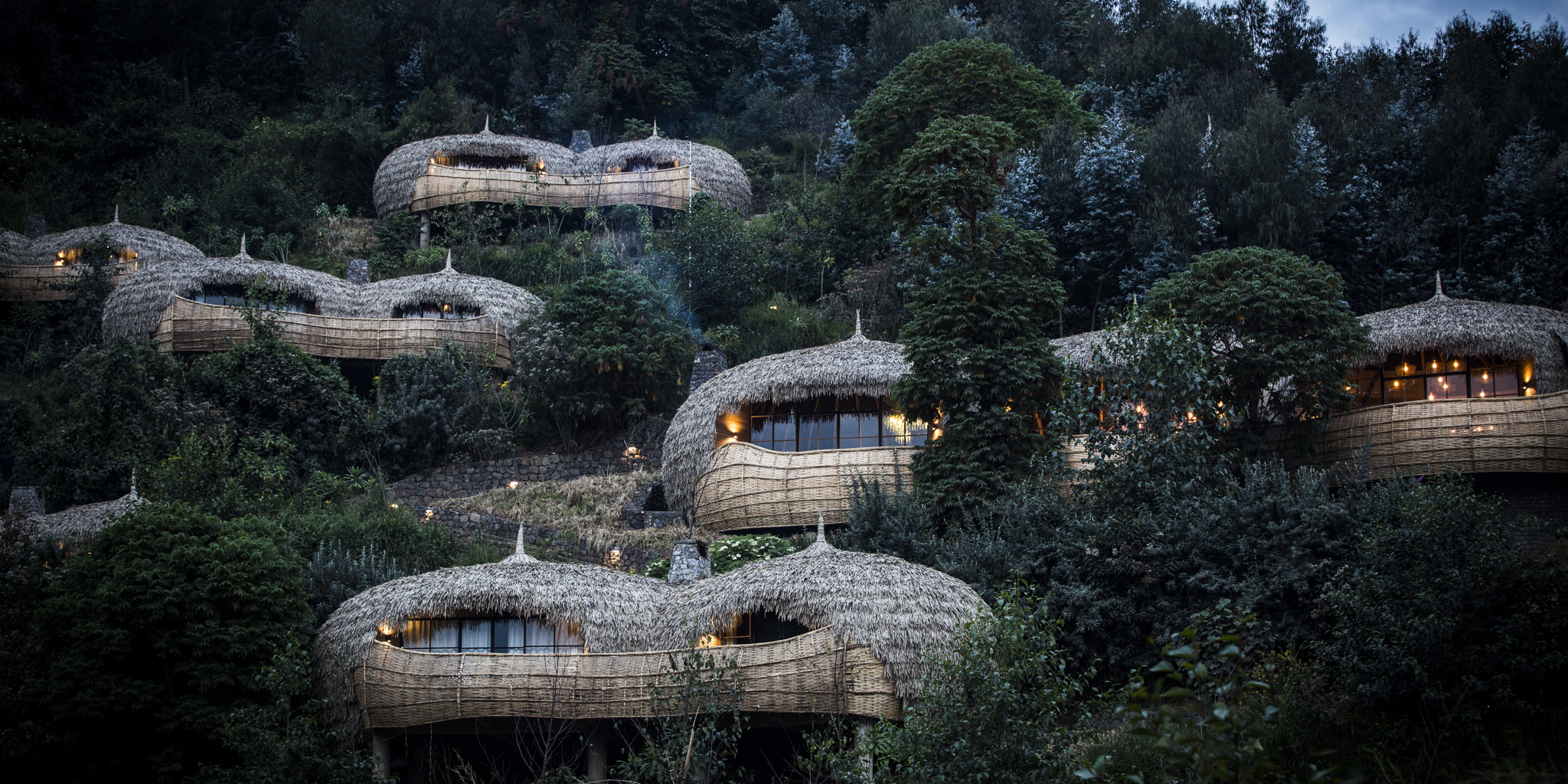Almost every new safari property opening this year engages in eco-friendly practices, including conservation programmes and more sustainable approaches to reduce environmental impact. We fully support these efforts – this is how we safeguard these beautiful habitats for years to come!
Top 10 Eco-Friendly Properties in Africa
Our travel experts have chosen the Top 10 eco-properties in Africa to help you plan the perfect holiday for you and your loved ones.
1. Elephant Watch Camp, Kenya
Pitched towards elephant conservation and aspiring to be green to the core, Elephant Watch Camp is a sight to behold! Here, boho-chic meets adventure bush camp – all of the buildings and luxury en-suite tents are constructed from fallen trees, solar-hardened earth plaster, and sustainably harvested palm thatch, and for the finishing touch they’re decorated with vibrant cotton drapes and colourful cushions.
As well as being a seriously eco-friendly camp, Elephant Watch is committed to elephant conservation and is perfectly placed in the Samburu National Reserve to do just that. The camp is run by Saba Douglas-Hamilton, highly acclaimed wildlife conservationist and television presenter. Guests can enjoy incredible sightings of these gentle, grey giants while learning about the efforts of the Save the Elephant Foundation, established by Saba’s father Iain Douglas-Hamilton.
2. Ngaga Camp, Republic of the Congo
Ngaga Camp is located in ‘gorilla central’, making it a focal point for frontline, world-class research. There are six elevated guest rooms, each with wrap-around walkways and views into the forest canopy. This treehouse-like camp is constructed from natural materials using traditional techniques, such as raffia palm roofing panels that have been locally woven. It has all been specially built for the lightest possible environmental impact. Within a short distance from Odzala–Kokoua National Park, Ngaga is a brilliant base from which to head out on gorilla treks for unforgettable primate encounters. A trip to Ngaga combines very well with a stay at eco-friendly Lango Camp – both options are owned and operated by Odzala Discovery Camps. Lango is located in the south-central part of Odzala and overlooks a marshy bai that is often dotted with flocks of African green pigeons and African grey parrots. It’s also visited by herds of forest buffalo during the day and forest elephant at night.
3. Cottar's 1920s Camp, Kenya
Established in the mid-1990s, Calvin and Louise Cottar’s vision for the camp includes being financially sustainable for the next 100 years. They aim to stay true to the family tradition of providing an authentic and individualised safari experience, while honouring a balance between conservation, prosperous commerce, community, and culture. Cottar’s prides itself on being an extended family of people from Nairobi, Laikipia, the Maasai Mara, and beyond – a family of many tribes! They are also actively engaged in the preservation of natural habitats and wildlife in the Maasai Mara National Reserve and Serengeti National Park, securing the areas from poachers for the protection of the community. Cottar’s aims to be the driving force for a new period of hope for their local community and wildlife.
4. Greystoke Mahale, Tanzania
Well respected as one of Africa’s finest lodges, Greystoke Mahale is nothing short of spectacular. With access to the forested slopes of the Mahale Mountains, this is a total primate paradise! Greystoke Mahale is set along the sandy shores of Lake Tanganyika and overlooks the calm waters to the front, with the chimpanzees’ forested homeland to the rear. The property’s six large bandas are made from wood reclaimed from wrecked or retired dhows, bought from villages along the lakeshore. The ladders are made from old fishermen’s canoes, and the thatching was gathered from palm trees located outside the national park. It may be on the more expensive side of accommodation offered in Tanzania, and getting to Mahale can often be complicated, but if you are a regular safari-goer and looking for something remote, beautiful, authentic, with the added bonus of being eco-friendly, Greystoke Mahale should absolutely be your next adventure!
5. Wilderness Bisate Lodge, Rwanda
Resembling weaver bird nests, found alongside many Rwandese rivers, the rooms at Wilderness Bisate Lodge are cocoons of comfort and slick design. They all boast a contemporary geometric style, a bamboo balcony facing the wondrous Mount Bisoke, and a huge bathroom with a large resin bathtub. As well as simply enjoying the stay in one of the most luxurious properties imaginable, guests of Bisate participate in the rehabilitation and conservation efforts set up by ecotourism pioneer, Wilderness. With its emerald-green chandeliers made from recycled glass and other features constructed using local volcanic stone, Bisate Lodge is a vision of jungle character and luxurious eco-accommodation. Additionally, prior to opening in 2017, it was involved in a community-based project centred on indigenous reforestation. Now welcoming guests, Bisate is forging forwards with rehabilitation and biodiversity conservation efforts, focusing primarily on the iconic yet critically endangered species: the mountain gorilla.
6. Wayo Manyara Green, Tanzania
Lake Manyara is one of the first stops on a classic northern Tanzania circuit, a delightful first taste of the region’s beautiful landscape and home to some interesting and diverse game-viewing opportunities. Wayo Manyara Green is only the second lodge to be allowed to open within the park, due to Wayo’s brilliant green ethos. Wayo prides itself in the fact that all of the company’s ‘green camps’ operate in the most environmentally sustainable manner possible. They use low-impact energy creation and solar-powered light, minimise waste in camps by preparing meals in Arusha, and are plastic free as much as possible.
7. Wilderness Desert Rhino Camp, Namibia
Wilderness Desert Rhino is a hugely successful joint venture between Namibia’s ‘Save the Rhino’ trust and the luxury ecotourism operator Wilderness, and offers one of the finest rhino-viewing experiences in Africa. It consists of just eight canvas tents and lies among 450,000 hectares of rolling, rocky hills that make up the Palmwag Concession. For the last 30 years, Save the Rhino has been solely responsible for helping protect the desert-adapted black rhino in this part of Namibia. Now, a portion of revenue from every guest at Desert Rhino goes towards the trust, which trains local people how to protect, patrol, and monitor the wildlife, ultimately contributing to the sustainability of the whole region.
8. Fanjove Island, Tanzania
Fanjove Lodge sits on its own private island. The design of the lodge is elegant but simple and everything is eco-friendly, using only locally sourced materials such as sustainable wood, palm leaves, and thatch. Guests sleep in six large bandas situated around a headland. They are all solar powered and have en-suite bathrooms with flush toilets and a hot open-air shower. This is an absolutely beautiful beach option, and the fact that it is so ecologically minded makes those margaritas taste even nicer!
9. El Karama Eco Lodge, Kenya
If the name didn’t give it away, the proudly featured ‘Eco Warrior’ award on this property’s website should make it obvious that El Karama is a strong contender for one of Africa’s most eco-friendly lodges! Set within the Laikipia district, El Karama is actually based on a private working cattle ranch where conservation is key. It follows a reduce, re-use, and recycle policy, and the lodge’s energy source is 100 percent solar. Most of the buildings and structures have been constructed from reclaimed wood, and even the swimming pool is eco-friendly – it uses the ECOsmarte system, which is the first of its kind in the area. This low-key property is a great choice for families on a first-time trip to Kenya, thanks in no small part to its great activities! Guests can go on tours of the ranch, enjoy game drives in the wildlife-filled area, and take day trips, which could include camel walks, half-day horse rides, or a rhino retreat. Even going on a game drive has a beneficial impact on the region, as every guide submits a report on wildlife counts and sightings, which in turn helps with monitoring and research.
10. Grootbos Private Nature Reserve, South Africa
A recent survey of the Grootbos Private Nature Reserve showed that the area is home to an incredible 765 species of fynbos, 100 of which are endangered and six of which had never been seen before! The Lutzeyer family discovered this hilltop location in the 1990s and have since spent years running extensive conservation and horticulture programmes to preserve this floral mecca. Removing invasive species, returning the farmland to the fynbos, then building a select few properties in natural clearings… the Lutzeyers have created something very special here. Grootbos Forest Lodge, Garden Lodge, and the Villa are undeniably the leading examples of sustainable eco-tourism and five-star luxury in South Africa’s Western Cape.

Let us help you create your own bespoke African safari.
Get matched with a dedicated Yellow Zebra expert and plan the adventure of a lifetime
 UK / International
UK / International
 USA
USA
 CA
CA
 Australia
Australia















